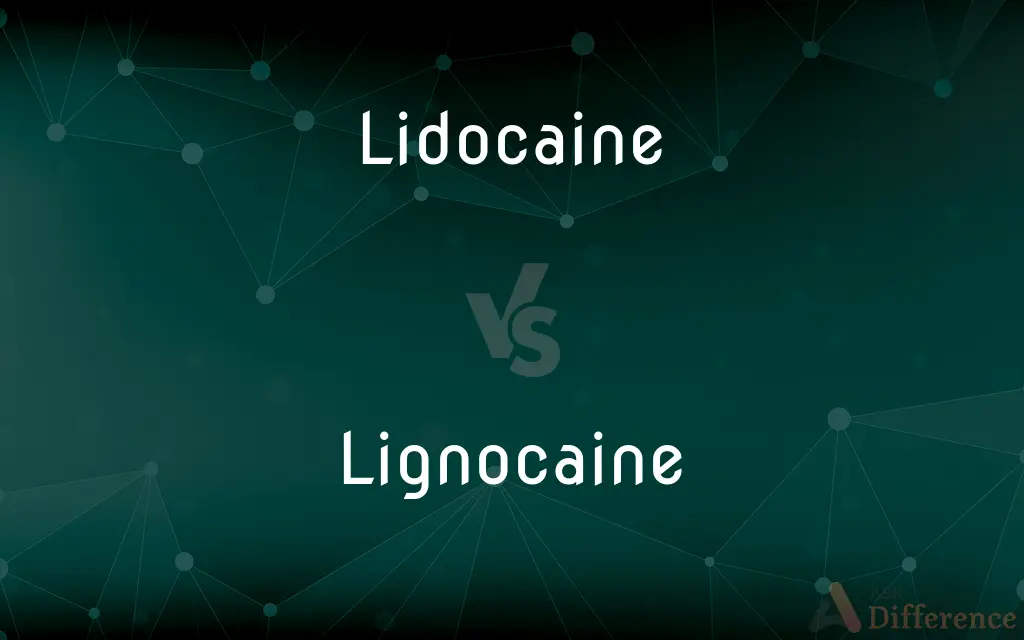Lidocaine vs. Lignocaine — What's the Difference?
By Tayyaba Rehman — Updated on October 28, 2023
Lidocaine and Lignocaine are the same local anesthetic, but "Lidocaine" is the term used in the US and "Lignocaine" is used in the UK and other countries.

Difference Between Lidocaine and Lignocaine
Table of Contents
ADVERTISEMENT
Key Differences
Within the realm of pharmaceuticals, names can sometimes differ based on regions, leading to potential confusion. Lidocaine and Lignocaine are prime examples. In essence, both terms refer to the same chemical compound, a local anesthetic used in medical procedures and treatments. It's a versatile drug, often utilized in procedures ranging from dental to minor skin surgeries.
Lidocaine is the term predominantly used in the United States and some other countries. It's a name familiar to many American health professionals and patients. This nomenclature can be found in academic papers, medical prescriptions, and over-the-counter products in the US.
Conversely, Lignocaine is the designation used in the United Kingdom, Australia, and some other nations. If you were to peruse a British medical journal or visit a pharmacy in London, for instance, you'd encounter "Lignocaine" rather than "Lidocaine."
Despite the difference in naming conventions, it's crucial to understand that they are identical in terms of chemical structure and function. Regardless of whether a doctor prescribes Lidocaine in New York or Lignocaine in Sydney, the patient is receiving the same effective local anesthetic.
Comparison Chart
Usage Location
Predominantly in the US.
In the UK, Australia, and some other countries.
ADVERTISEMENT
Chemical Structure
Same as Lignocaine.
Same as Lidocaine.
Medical Function
Local anesthetic.
Local anesthetic.
Name Origin
Derived from the original name Lignocaine.
Original name before Lidocaine became common in the US.
Availability
Available in the US as over-the-counter and prescription.
Available in the UK and other countries similarly.
Compare with Definitions
Lidocaine
A medication to treat irregular heart rhythms.
The patient was administered Lidocaine for his arrhythmia.
Lignocaine
A topical numbing agent.
He used Lignocaine cream for the painful rash.
Lidocaine
A local anesthetic used in medical procedures.
The dentist used Lidocaine to numb the area before the procedure.
Lignocaine
A drug known for its analgesic properties.
Lignocaine patches were recommended for his joint pain.
Lidocaine
A versatile drug for pain relief.
Lidocaine patches were prescribed for her back pain.
Lignocaine
A medication utilized for cardiac rhythm issues.
She was given Lignocaine after experiencing heart palpitations.
Lidocaine
A numbing medication for topical application.
She applied Lidocaine to the insect bite to alleviate the itch.
Lignocaine
Available in diverse forms like sprays, solutions, and patches.
The doctor suggested a Lignocaine spray for the sore throat.
Lidocaine
A compound used in various forms including gels, creams, and injections.
The Lidocaine injection provided immediate relief.
Lignocaine
A local anesthetic used in various medical treatments.
The surgeon administered Lignocaine before the minor operation.
Lidocaine
Lidocaine, also known as lignocaine and sold under the brand name Xylocaine among others, is a local anesthetic of the amino amide type. It is also used to treat ventricular tachycardia.
Lignocaine
(pharmaceutical drug) lidocaine.
Lidocaine
A synthetic amide, C14H22N2O, used chiefly in the form of its hydrochloride as a local anesthetic and antiarrhythmic agent.
Lidocaine
(pharmaceutical drug) A crystalline compound C14H22N2O that is used in the form of its hydrochloride as a local anesthetic and as an antiarrhythmic agent.
Lidocaine
A local anesthetic (trade names Lidocaine and Xylocaine) used topically on the skin and mucous membranes
Common Curiosities
Is Lidocaine used in dental procedures?
Yes, Lidocaine is often used as a local anesthetic in dental procedures.
Why do we have two different names for the same compound?
Naming conventions can differ based on regions; Lidocaine is more common in the US, while Lignocaine is used in the UK and other countries.
Are there any differences in the side effects of Lidocaine and Lignocaine?
No, since they are the same compound, their side effects, when experienced, are identical.
Is Lidocaine available over the counter?
Yes, Lidocaine is available in both prescription and over-the-counter forms in the US.
Are there other local anesthetics besides Lidocaine/Lignocaine?
Yes, there are other local anesthetics, but Lidocaine/Lignocaine is one of the most commonly used.
Can both Lidocaine and Lignocaine be used topically?
Yes, both can be applied topically to numb an area.
Can I use Lidocaine for insect bites?
Yes, Lidocaine can be used topically for temporary relief from insect bites.
Are Lidocaine and Lignocaine the same drug?
Yes, they are the same drug but are named differently based on regions.
Is there a difference in efficacy between Lidocaine and Lignocaine?
No, they are the same compound and have the same efficacy.
How is Lignocaine administered?
Lignocaine can be administered in various ways, including injections, creams, gels, sprays, and patches.
In which countries is Lignocaine predominantly used?
Lignocaine is predominantly used in the UK, Australia, and some other nations.
Can Lidocaine be used for heart-related issues?
Yes, Lidocaine can be used to treat certain irregular heart rhythms.
Share Your Discovery

Previous Comparison
Nucleus vs. Nucleoid
Next Comparison
Climatology vs. MeteorologyAuthor Spotlight
Written by
Tayyaba RehmanTayyaba Rehman is a distinguished writer, currently serving as a primary contributor to askdifference.com. As a researcher in semantics and etymology, Tayyaba's passion for the complexity of languages and their distinctions has found a perfect home on the platform. Tayyaba delves into the intricacies of language, distinguishing between commonly confused words and phrases, thereby providing clarity for readers worldwide.















































